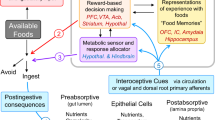Abstract
Investigations with laboratory animals can reveal much about the basic psychobiological determinants of food preference and diet-induced overeating. When offered a choice of foods, rats typically prefer high-fat and/or high-sugar food items over their nutritionally balanced chow diet. In addition, they may increase their total energy intake by 20–40% and consequently develop mild to moderate obesity. The role of flavor and postingestive nutritional actions on the preference for and overconsumption of fat- and sugar-rich foods has been questioned. To evaluate flavor and nutritional effects independently, recent studies have used self-regulated intragastric feeding paradigms. The results indicate that enhancing the flavor of food can significantly increase energy intake when nutrient composition is held constant. Similarly, changes in nutrient composition (ie fat–carbohydrate ratio) can significantly influence energy intake when flavor is held constant. In addition, postingestive nutrient actions can significantly alter flavor preferences through a conditioning process as function of nutrient type and concentration. Thus, food preferences and overeating result from interactions between the orosensory and nutritional properties of food.
Similar content being viewed by others
Author information
Authors and Affiliations
Corresponding author
Rights and permissions
About this article
Cite this article
Sclafani, A. Psychobiology of food preferences. Int J Obes 25 (Suppl 5), S13–S16 (2001). https://doi.org/10.1038/sj.ijo.0801905
Published:
Issue Date:
DOI: https://doi.org/10.1038/sj.ijo.0801905
- Springer Nature Limited
Keywords
This article is cited by
-
Role of anterior piriform cortex in the acquisition of conditioned flavour preference
Scientific Reports (2016)
-
The endocrinology of taste receptors
Nature Reviews Endocrinology (2015)
-
Short-term moderate exercise provides long-lasting protective effects against metabolic dysfunction in rats fed a high-fat diet
European Journal of Nutrition (2015)
-
Diet-induced obesity: dopamine transporter function, impulsivity and motivation
International Journal of Obesity (2013)
-
RGS6 Variants Are Associated With Dietary Fat Intake in Hispanics: The IRAS Family Study
Obesity (2011)




